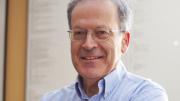Coolidge professor of computer science and applied mathematics Leslie Valiant, a member of the Harvard faculty since 1982, has been named the 2010 winner of the A. M. Turing Award, conferred by the Association for Computing Machinery, for his fundamental contributions to computer science.
The award, the premier professional recognition in computing science, includes a $250,000 prize.
Valiant was recognized for advancing research on artificial intelligence, natural-language processing, handwriting recognition, and computer vision, according to a news release issued by the School of Engineering and Applied Sciences. The release cites his computer-sciences faculty colleague, Michael D. Smith, now dean of the Faculty of Arts and Sciences: “Les Valiant is known by researchers the world over for his revolutionary contributions to theoretical computer science. His work has reoriented this entire field in recent decades, single-handedly creating or transforming any number of key research areas. Les is clearly deserving of the Turing Award; as a colleague and friend I am delighted by this recognition of his myriad contributions to our field."
Of late, according to the release, Valiant has made important contributions in computational neuroscience, developing a mathematical model of the brain and relating its structure to cognitive functions—with subsequent applications to computer science, neurobiology, artificial intelligence, and other fields. The basic problem, as described in his faculty homepage, remains determining “how the weak model of computation that cortex apparently offers can support cognitive computation at all. Professor Valiant has been working on showing how broad sets of primitive operations can be computed robustly and on a significant scale even on such a weak model.”
Valiant previously received the Nevanlinna Prize at the International Congress of Mathematicians in 1986, the Knuth Award in 1997, and the European Association for Theoretical Computer Science Award in 2008. He is a Fellow of the Royal Society (London) and a member of the National Academy of Sciences (USA).
Read the Boston Globe coverage of the award here.









